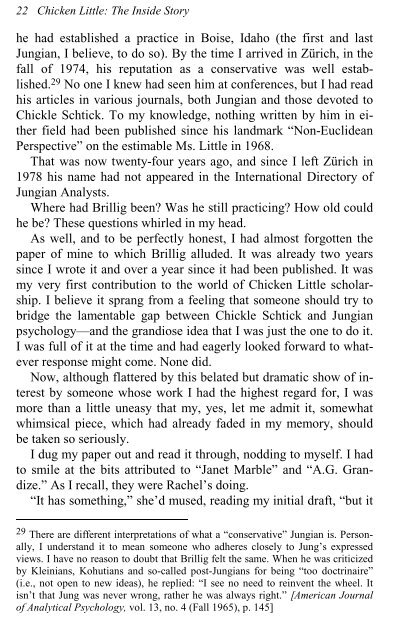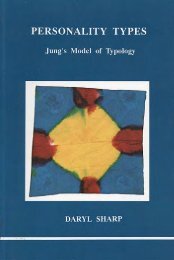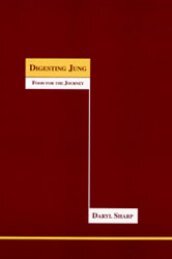Chicken Little: The Inside Story (A Jungian ... - Inner City Books
Chicken Little: The Inside Story (A Jungian ... - Inner City Books
Chicken Little: The Inside Story (A Jungian ... - Inner City Books
You also want an ePaper? Increase the reach of your titles
YUMPU automatically turns print PDFs into web optimized ePapers that Google loves.
22 <strong>Chicken</strong> <strong>Little</strong>: <strong>The</strong> <strong>Inside</strong> <strong>Story</strong><br />
he had established a practice in Boise, Idaho (the first and last<br />
<strong>Jungian</strong>, I believe, to do so). By the time I arrived in Zürich, in the<br />
fall of 1974, his reputation as a conservative was well established.<br />
29 No one I knew had seen him at conferences, but I had read<br />
his articles in various journals, both <strong>Jungian</strong> and those devoted to<br />
Chickle Schtick. To my knowledge, nothing written by him in either<br />
field had been published since his landmark “Non-Euclidean<br />
Perspective” on the estimable Ms. <strong>Little</strong> in 1968.<br />
That was now twenty-four years ago, and since I left Zürich in<br />
1978 his name had not appeared in the International Directory of<br />
<strong>Jungian</strong> Analysts.<br />
Where had Brillig been? Was he still practicing? How old could<br />
he be? <strong>The</strong>se questions whirled in my head.<br />
As well, and to be perfectly honest, I had almost forgotten the<br />
paper of mine to which Brillig alluded. It was already two years<br />
since I wrote it and over a year since it had been published. It was<br />
my very first contribution to the world of <strong>Chicken</strong> <strong>Little</strong> scholarship.<br />
I believe it sprang from a feeling that someone should try to<br />
bridge the lamentable gap between Chickle Schtick and <strong>Jungian</strong><br />
psychology—and the grandiose idea that I was just the one to do it.<br />
I was full of it at the time and had eagerly looked forward to whatever<br />
response might come. None did.<br />
Now, although flattered by this belated but dramatic show of interest<br />
by someone whose work I had the highest regard for, I was<br />
more than a little uneasy that my, yes, let me admit it, somewhat<br />
whimsical piece, which had already faded in my memory, should<br />
be taken so seriously.<br />
I dug my paper out and read it through, nodding to myself. I had<br />
to smile at the bits attributed to “Janet Marble” and “A.G. Grandize.”<br />
As I recall, they were Rachel’s doing.<br />
“It has something,” she’d mused, reading my initial draft, “but it<br />
29 <strong>The</strong>re are different interpretations of what a “conservative” <strong>Jungian</strong> is. Personally,<br />
I understand it to mean someone who adheres closely to Jung’s expressed<br />
views. I have no reason to doubt that Brillig felt the same. When he was criticized<br />
by Kleinians, Kohutians and so-called post-<strong>Jungian</strong>s for being “too doctrinaire”<br />
(i.e., not open to new ideas), he replied: “I see no need to reinvent the wheel. It<br />
isn’t that Jung was never wrong, rather he was always right.” [American Journal<br />
of Analytical Psychology, vol. 13, no. 4 (Fall 1965), p. 145]










